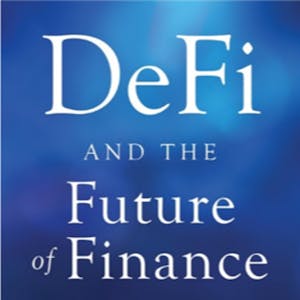Decentralized Finance (DeFi) Infrastructure
Decentralized Finance: The Future of Finance is a set of four courses taught by Campbell R. Harvey (Professor of Finance at the Fuqua School of Business, Duke University, and a Research Associate of the National Bureau of Economic Research) that focus on decentralized finance (DeFi). In this first course, we begin by exploring the origins of DeFi and take a broad historical view from the earliest barter economies, such as the first peer-to-peer exchanges of bartering, to present day. The course also looks at historical examples of money having value even though it is not officially backed. We then focus on the key infrastructure components: blockchain, cryptocurrency, smart contracts, oracles, stablecoins and decentralized applications (or dApps). This includes discussion of the mechanics of the Ethereum and Bitcoin blockchains including cryptographic hashing.
Next, we focus on the specific problems that DeFi is designed to solve: inefficiency (costly, slow, and insecure today), limited access (1.7 billion are unbanked), opacity (we need to trust regulators to monitor banks and the regulators have mixed records), centralized control (financial system is oligopolistic imposing higher fees than we would have in a competitive market) and lack of interoperability (it is difficult to move funds from one financial institution to another today). The course closes by exploring many of the myths about the crypto space.
Articulate the history and origins of decentralized finance
Define the key components of decentralized finance's infrastructure
Explain which problems decentralized finance is designed to solve and how
Identify myths or common misconceptions about decentralized finance
Syllabus
Syllabus - What you will learn from this course
Week 1
The History of Decentralized Finance
Week 2
DeFi Foundations
Week 3
Problems DeFi Solves
Week 4
DeFi Myths and Facts
FAQ
When will I have access to the lectures and assignments?
Access to lectures and assignments depends on your type of enrollment. If you take a course in audit mode, you will be able to see most course materials for free. To access graded assignments and to earn a Certificate, you will need to purchase the Certificate experience, during or after your audit. If you don't see the audit option:
The course may not offer an audit option. You can try a Free Trial instead, or apply for Financial Aid.
The course may offer 'Full Course, No Certificate' instead. This option lets you see all course materials, submit required assessments, and get a final grade. This also means that you will not be able to purchase a Certificate experience.
What will I get if I subscribe to this Specialization?
When you enroll in the course, you get access to all of the courses in the Specialization, and you earn a certificate when you complete the work. Your electronic Certificate will be added to your Accomplishments page - from there, you can print your Certificate or add it to your LinkedIn profile. If you only want to read and view the course content, you can audit the course for free.
Is financial aid available?
Yes. In select learning programs, you can apply for financial aid or a scholarship if you can’t afford the enrollment fee. If fin aid or scholarship is available for your learning program selection, you’ll find a link to apply on the description page.
Will I receive a transcript from Duke University for completing this course?
No. Completion of a Coursera course does not earn you academic credit from Duke; therefore, Duke is not able to provide you with a university transcript. However, your electronic Certificate will be added to your Accomplishments page - from there, you can print your Certificate or add it to your LinkedIn profile.
Reviews
The course largely follows the instructor's book albeit with an easier to follow introduction. As such, this first course is an overview and it gets us ready for the information to follow.
THIS IS A GREAT COURSE, VERY WELL EXPLAINED, THE TEACHER DOES REALLY WELL DOING ANALOGES WHILE GOING TROUGH CONCEPTS, I RECOMMEND IT 100%
Great introduction for a novice or someone that already has crypto knowlegable. A bit intermeidate with finance concepts, I recommend having some introductory knowledge.
A good part 1 of the overall course! It's hard to find consolidated knowledge of DeFi browsing on Twitter, so this is very useful to understand the full scope of the field.
